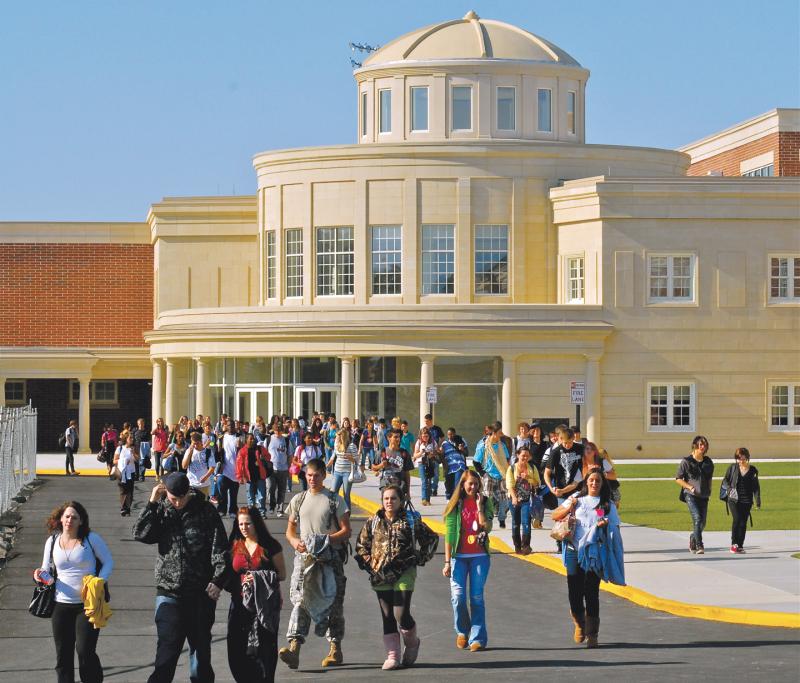Cape Henlopen prides itself as one of the best academic and sports schools in the state. A recent audit shows Cape is also one of the highest spending for noneducational expenses.
State Auditor Thomas Wagner said the audit began as analysis of expenditures across Delaware's 19 school districts, looking into ways the state can save money.
“We wanted to see how we're spending money outside the classroom,” Wagner said.
But during the process, he said, auditors found questionable spending on meals and in-state lodging.
For fiscal year 2016, Cape Henlopen School District spent more than $27,000 on meals, second to Lake Forest which spent more than $28,000. “The combined purchases for these two school districts accounted for over half of the amount spent by school districts statewide,” the audit states.
Overall, districts charged more than $98,000 for meals using a state purchasing card, known as a Pcard. Wagner said spending on the Pcard is not the issue. It's a spending mechanism that the state wants districts to use because it's efficient and the state gets points, similar to a credit card. “We actually encourage the use of it,” he said. School districts can also pay for nonclassroom services by using vouchers or personal reimbursement.
Analyzing Pcard expenses only, Wagner said, auditors realized some school districts spend a lot of money on meals and in-state lodging.
Sussex Tech was ranked fifth for in-state meal purchases with about $6,300 spent.
The audit details a May 2015 retirement and recognition reception Cape Henlopen held at the Atlantic Sands Hotel & Conference Center to honor 35 retirees and eight teachers of the year. The cost was about $11,000 for 207 guests. In a letter to the auditor, Cape's Director of Business Operations Oliver Gumbs pointed out that attendees paid $2,884 for the event, also noting the district would continue to evaluate policies to ensure accountability and transparency.
Superintendent Robert Fulton could not be reached for comment.
Wagner said auditors could find no law that limits how much a school district can spend for employee recognition activities. However, he said, the state limits all other state-sanctioned recognition programs to $10 per person each year.
“Since school districts are exempt from some state-procurement rules … they have increased autonomy over the use of their funds, particularly the local portion,” the audit states. “As a result, funds that could be spent in the classroom are being used for other purposes.”
Wagner said schools should spend public money to educate children, not pay for meals.
In-state lodging for a small state
The audit also examined in-state lodging purchases made by school districts. Again, Cape Henlopen was the second highest-spending district with more than $3,000 spent for in-state lodging in 2016. The audit notes that Cape spent about $1,300 listed under in-state lodging to partially pay for the retirement event at the Atlantic Sands.
Red Clay Consolidated School District spent the most on in-state lodging the Pcard, charging about $5,300.
Wagner questioned why overnight lodging is needed in a state as small as Delaware.
“We're saying that there is a lot of expenditures on in-state hotels for a state that is smaller than a ton of counties in this country,” he said.
Coding inconsistencies
During the review, auditors uncovered inconsistencies in the way districts code expenses. “Because there's no unified coding, everyone codes differently,” Wagner said.
To clear up confusion, he said, school districts should use a unified system of codes to input spending data.
In two questionable coding examples, the audit notes Indian River spent $2,140 coded as table games code for computer services, while Cape Henlopen spent $200 on sticky buns coded as computer supplies.
“Nobody could figure what you would have a table game category for,” Wagner said.
The sticky buns were bought for an employee holiday breakfast, according to the audit.
Prohibited purchases
Other purchases were flat out prohibited by the state's Budget and Accounting Manual, the audit states.
This included a $60 purchase for flowers and $200 for two $100 gift certificates to Fish On! made by Cape Henlopen. Sussex Tech spent about $210 on two flower purchases.
Flowers, greeting cards and gift cards are among expenses prohibited by the budget manual. To prevent improprieties, the audit suggests collecting private donations for those items.
Establishing uniform guidelines and clearing up ambiguity on expenses outside the classrooms could save the state money during tight budget times, Wagner said. At $341 million a year, the state's public education budget is 30 percent of the state's budget with administrative salaries for educators among the highest in the state.
“On the education side, it's not clear. In this case, it's very murky waters,” Wagner said.
Melissa Steele is a staff writer covering the state Legislature, government and police. Her newspaper career spans more than 30 years and includes working for the Delaware State News, Burlington County Times, The News Journal, Dover Post and Milford Beacon before coming to the Cape Gazette in 2012. Her work has received numerous awards, most notably a Pulitzer Prize-adjudicated investigative piece, and a runner-up for the MDDC James S. Keat Freedom of Information Award.

























































